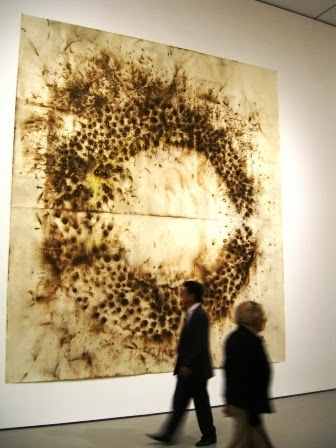 |
| Fallen Blossoms, controlled explosion at the Philadelphia Museum of Art, Cai Guo-Qiang |
“I came to send fire on the earth, and how I wish it were already kindled! But I have a baptism to be baptized with, and how distressed I am till it is accomplished! Do you suppose that I came to give peace on earth? I tell you, not at all, but rather division. For from now on five in one house will be divided: three against two, and two against three. Father will be divided against son and son against father, mother against daughter and daughter against mother, mother-in-law against her daughter-in-law and daughter-in-law against her mother-in-law.”
Flash! Outside of shiny things, humans seem to have an unstoppable interest in fire. Things that burn and explode. Things that go "Zap!" Things that go "Boom!"
Cai Guo-Qiang is a Contemporary Artist from China that specializes in such things. He has made a successful career of using the ancient Chinese invention of gunpowder to create art. However his work isn't just about the bright lights and loud noises that come with explosions but rather about what fire leaves behind. Fire is only the medium/tool that he uses to create drawings. Often we focus on fire as an agent of destruction but this dangerous medium can also create. It is on that note that we look at today's verse in Luke 12. Christ speaks of strange things: fire baptism and division. In the center of it all is a startling statement that he has not come to bring peace! Could it be that the Prince of Peace is really the Lord of War? Is Jesus denying all of that "turn the other cheek", and "pray for your enemies" stuff that he was saying earlier? No, remember that we must always understand scripture in the context of other scripture...and the testimony of Scripture as a whole. So it appears that Jesus was using hyperbole, however, it was used to a specific end. He indeed is the Prince of Peace but his fire would indeed usher in destruction in order to create beauty.
 |
| Cai Guo-Qiang, Gunpowder |
Baptism is a spiritual purifying agent. That is generally understood. We symbolically wash away our old sinful nature in submission to Christ's commands. But I suspect that when Jesus speaks of his own impending baptism that distresses him that he isn't referring to the traditional water baptism. Christ is referring to a "baptism by fire." When I say baptism by fire I am not making an allusion to the baptism of the Holy Spirit...I am referring to baptism through sacrifice. It is a baptism that was reserved specifically for Jesus. Suffering as a spiritual purifying agent, yet it is not one that needs to be willingly sought out. Don't go looking for Trouble. If needs be, Trouble will find you... like Chuck Norris. Even though Christ's baptism of fire on the cross would be prepared for only him, it would still have universal implications. One of these immediate implications would be division.
 |
| Cai Guo-Qiang |
 |
| Cai Guo-Qiang |
- 1 Corinthians 1:23-24, St. Paul
There is one last quality to the Message of the Cross that burns. Yet it is less like fire and more like indigestion. Any of you who have spent any time in unbelief are familiar with that feeling. Christianity is hard to swallow. It is hard to mentally digest the whole story of Christ's redemption. To St. Paul's Jewish brethren the message of Christ's cross presented a stumbling block: the idea that salvation was not through ethnic identity as a child of Abraham and one of God's chosen people, but rather through faith in one specific rabbi, Jesus, as the Son of God. To the Greek philosophers that St. Paul encountered abroad the message of Christ's cross was a presentation of foolishness: the idea that amongst all of the religions and people of the world, God would chose the humble Israelites to send his Son through as the only means of salvation. This debate still exists today and is called The Scandal of Particularity. It is a pretty strong argument. I live in a pluralistic culture and I generally believe in compromise: whether it be political, at my job or what have you, usually a suitable answer can be found by cooperating and merging ideas and paths. Yet there is one area where I do not practice or believe in this principal: love. When I married my beautiful wife I chose to love her and forsake all others. Does this mean that I hate everyone else in the world? No, I maintain friendship with many people but the truest and most dedicated love is for my wife. Hopefully we will produce children one day and we can share our intimate love within even more people. People that have been born of our love. God often described his relationship with Israel as a spousal relationship. If the Israelites engaged in idolatry he likened it to adultery. Likewise, Scripture refers to the Church as the Bride of Christ. Truth is singular in its expression when that expression is Love. Truth bears children of faith when that expression is Love. Truth burns like a fire when that expression is Love.

No comments:
Post a Comment